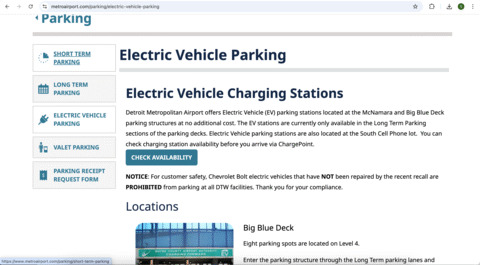Detroit airport bans parking of faulty Chevy Bolts
Experts warn of mandate-driven problems
The Wayne County Airport Authority prohibits motorists from parking at the Detroit Metro Airport Chevrolet Bolts that have not received the repairs recommended by a recall notice from General Motors. The authority cites concerns that the vehicles could catch fire.
“For customer safety, Chevrolet Bolt electric vehicles that have NOT been repaired by the recent recall are prohibited from parking at all DTW facilities,” said the notice on the airport’s website.
 Screenshot of Detroit Metro Airport's website.
Screenshot of Detroit Metro Airport's website.
Bolts that lack the needed repairs could cause catch on fire, Matt Morawski, director of communications at the airport authority, told Michigan Capitol Confidential in an email. The airport is reviewing parking policies for electric vehicles, he added.
“This work is being done under an environment of changing regulatory and technological requirements,” Morawski added.
The National Highway Traffic Safety Administration warned Bolt owners on Aug. 20, 2021, to park their vehicles outside, citing safety concerns.
The concerns expressed by the airport authority show what happens when government policies get ahead of markets and technological development, said Jason Hayes, director of energy and environmental policy at the Mackinac Center for Public Policy.
“When governments force products into the market before they have been adequately tested and vetted, you often end up with bad (or even dangerous) results,” Hayes told CapCon in an email.
Mandates and financial incentives from state and federal governments encourage automakers to produce electric vehicles, Hayes said.
Consumers, not the government, should take the lead in using new technologies, said Theodore Bolema, senior editor at the Mercatus Center at George Mason University and a member of the Board of Scholars at the Mackinac Center.
“When the government tries to artificially speed up the adoption of a technology by pressuring manufacturers to accelerate their development of new products, there will be more unanticipated problems and less opportunity for manufacturers in the industry and related markets to address the problems before the products hit the market,” Bolema wrote to CapCon in an email.
Gov. Gretchen Whitmer mandated all state-owned vehicles to be electric by 2040.
Consumers have taken a more cautious approach, with approximately 50,000 EVs registered with the state, compared with millions of gas-powered vehicles. Nationally, sales of electric vehicles declined in the first quarter of 2024, according to the U.S. Energy Information Administration
Ford Motor Co. announced in April that it was slowing production of its electric vehicles.
General Motors gave notice in 2023 that it would discontinue making the Chevy Bolt. It then reversed course and said on Oct. 8, 2024, that production would resume, with a new Bolt to be offered in 2026.
Michigan Capitol Confidential is the news source produced by the Mackinac Center for Public Policy. Michigan Capitol Confidential reports with a free-market news perspective.

.jpg)
 State climate conference to tout clean energy plans that will raise electricity costs
State climate conference to tout clean energy plans that will raise electricity costs
 Michigan State Police lease first EV at $1,062 per month
Michigan State Police lease first EV at $1,062 per month
 Michigan firefighters dumped 3,000 gallons of water on burning Tesla
Michigan firefighters dumped 3,000 gallons of water on burning Tesla

 Bills would redirect corporate welfare to pave roads
Bills would redirect corporate welfare to pave roads
 Whitmer seeks $7.8M for road funding solution, six years after pledging to fix the roads
Whitmer seeks $7.8M for road funding solution, six years after pledging to fix the roads
 Michigan roads still crumbling despite nearly 47% budget hike since 2018
Michigan roads still crumbling despite nearly 47% budget hike since 2018